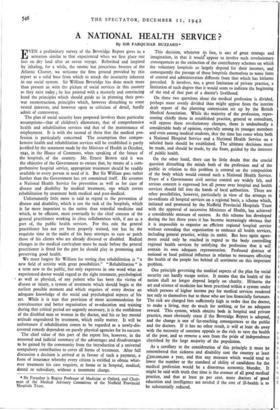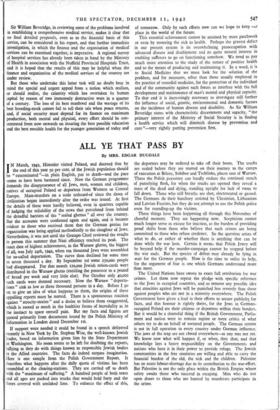A NATIONAL HEALTH SERVICE?
By SIR FARQUHAR BUZZARD*
EVEN a preliminary survey of the Beveridge Report gives us a sensation similar to that experienced when we first place our feet on dry land after an ocean voyage. Refreshed and inspired by inhaling, for a while, the ozonic but precarious breezes of the
Atlantic Charter, we welcome the firm ground provided by this
report as a solid base from which to attack the insecurity inherent in our social system. Sir William Beveridge has done much more
than present us with dr: picture of social services in this country as they exist today ; he has painted with a masterly and convincing hand the principles which should guide us in planning their post- war reconstruction, principles which, however disturbing to some vested interests, and however open to criticism of detail, hardly admit of controversy.
The plan of social security here proposed involves three particular assumptions—that of children's allowances, that of comprehensive health and rehabilitation services and that of the maintenance of employment. It is with the second of these that the medical pro- fession is particularly concerned. The assumption that compre- hensive health and rehabilitation services will be established is partly justified by the statement made by the Minister of Health in October, 1941, in the House of Commons, when speaking of the future of the hospitals, of the country. Mr. Ernest Brown said it was the objective of the Government to ensure that, by means of a com- prehensive hospital service, appropriate treatment should be ieadily available to every person in need of it. But Sir William goes rather further than the Government has yet committed itself. He assumes a National Health Service for prevention as well as for cure of disease and disability by medical treatment, one which covers rehabilitation by treatment both medical and post-medical.
Unfortunately little more is said in regard to the prevention of disease and disability, which is not the task of the hospitals, which
is far more important to the nation than remedial medicine and
which, to be efficient, must eventually b: the chief concern of the general practitioner working in close collaboration with, if not as a part of, the public health services. For this role the general practitioner has not yet been properly trained, nor has he the requisite time in the midst of his busy attempts to cure or patch those of his clients who are already diseased or disabled. Radical changes in the medical curriculum must be made before the general practitioner is fitted for the part he should play in promoting and preserving good health.
We must forgive Sir William for stating that rehabilitation is "a new field of activity with great possibilities." " Rehabilitation " is
a term new to the public, but only expresses in one word what an
experienced doctor would regard as the right treatment, psychological as well as physical, of any patient who has been the victim of disease or injury, a system of treatment which should begin at the earliest possible moment and which requires of every doctor an adequate knowledge of the social and psychological aspects of his art. While it is true that provision of more accommodation for convalescence and better organisation of re-education and training during that critical period are urgently necessary, it is the confidence of the disabled man or woman in the doctor, and his or her mental attitude engendered by treatment, which really matter. It will be unfortunate if rehabilitation comes to be regarded as a newly-dis- covered remedy dependent on purely physical agencies for its success.
The chief value of this part of the report lies, however, in the reasoned and judicial summary of the advantages and disadvantages to be gained by the community from the introduction of a universal compulsory contribution to cover all forms of treatment. After full discussion a decision is arrived at in favour of such a payment, a form of insurance whereby every citizen is entitled to obtain what- ever treatment his case requires, at home or in hospital, medical, dental or subsidiary, without a treatment charge.
*Sir Farquhar is Regius Professor of Medicine at Oxford, and Chair- man of the Medical Advisory Committee of the Nuffield Provincial Hospitals Trust. This decision, whatever its fate, is one of great courage and imagination, in that it would' appear to involve such revolutionary consequences as the extinction of the contributory schemes on which the voluntary hospitals so largely depend for their incomes, and consequently the passage of those hospitals themselves to some form of control and administration different from that which has hitherto prevailed. It involves, too, a great limitation of private practice, a limitation of such degree that it would seem to indicate the beginning of the end of that part of a doctor's livelihood.
On these two questions alone the medical profession is divided, perhaps more evenly divided than might appear from the interim draft report of the planning commission set up by the British Medical Association. While the majority of the profession, repre- senting chiefly those in established practice, general or consultant, will oppose these revolutionary changes, there is undoubtedly a considerable body of opinion, especially among its younger members and even among medical students, that the time has come when both a National Hospital Service and a National Health Service on a salaried basis should be established. The ultimate decisions must be made, and should be made, by the State, guided by the interests of public health.
On the other hand, there can be little doubt that the crucial question disturbing the minds both of the profession and of the public in relation to this problem is centred on the composition of the body which would control such a National Health Service. Fears of a Government civil service control are widely felt, and serious concern is expressed lest all power over hospital and health services should fall into the hands of local authorities. There are other possibilities, however, particularly in view of the attempt to co-ordinate all hospital services on a regional basis, a scheme which, initiated and promoted by the Nuffield Provincial Hospitals Trust with the approval of successive Ministers of Health, has achieved' a •considerable measure of success. As this scheme has developed during the last three years it has become increasingly obvious that it is impossible to organise an efficient regional hospital service without extending that organisation to embrace all health services, including general practice, within its ambit. But here again agree- ment could only be reached in regard to the body controlling regional health services by satisfying the profession that it will contain its own adequate representation. Profound distrust of national or local political influence in relation to measures affecting the health of the people lies behind all sentiment on this important problem.
One principle governing the medical aspects of the plan for social security can hardly escape notice. It means that the health of the nation shall no longer depend largely on charity. Hitherto the art and science of medicine has been practised within a system under which persons of higher income pay for medical services rendered not only to themselves but to those who are less financially fortunate. The sick are charged fees sufficiently high in order that the doctor, to make a living, may do much for nothing, or for no adequate reward. This system, which obtains both in hospital and private practice, must obviously cease if the Beveridge Report is adopted, and the change is one of far-reaching consequences to the public and the doctors. If it has no other result, it will at least do away with the necessity of constant appeals to the rich to save the health of the poor, and so remove a sore from the pride of independence cherished by the large majority of the population.
As a corollary to the consideration of this principle it must be remembered that sickness and disability cost the country at least k300,000,000 a year, and that any measure which would tend to lower the number or the standard of ability of candidates for the medical profession would be a disastrous economic. blunder. It might be said with truth that time is the essence of all good medical practice, and that at least 50 per cent, more doctors of good • education and intelligence are needed if the cost of ill-health is to be substantially reduced.
Sir William Beveridge, in reviewing some of the problems involved in establishing a comprehensive medical service, makes it dear that no final detailed proposals, even as to the financial basis of this service, can be considered in his report, and that further immediate investigation, in which the finance and the organisation of medical services can be examined together, is imperative. A regional survey of hospital services has already been taken in hand by the Ministry of Health in association with the Nuffield Provincial Hospitals Trust, and it is hoped that the results of this may be helpful when the finance and organisation of the medical services of the country are under review.
But those who undertake this latter task will no doubt bear in mind the special and urgent appeal from a nation which realises, or should realise, the calamity which has overtaken its human capital by reason of two immensely destructive wars in a quarter of a century. The loss of its best manhood and the wastage of its best breeding-stock cannot fail to tell their tale when peace returns, and, if social security must depend for its finance on maximum production, both mental and physical, every effort should be con- centrated from now onwards on insuring the best possible education and the best nossible health for the younger generation of today and of tomorrow. Only by such efforts now can we hope to keep our place in the world of the future.
This essential achievement cannot be attained by mere patchwork or even by restoring the sick to health. Perhaps the gravest defect in our present system is its overwhelming preoccupation with advanced disease and disablement and its quite natural interest in enabling sufferers to go on functioning somehow. We need to pay much more attention to the study of the nature of positive health and to the means of producing and maintaining it. In a word, it is to Social Medicine that we must look for the solution of the problem, and for measures, other than those usually employed in the practice of remedial medicine, for the protection of the individual and of the community against such forces as interfere with the full development and maintenance of man's mental and physical capacity. To that end it is increasingly necessary to investigate still further the influence of social, genetic, environmental and domestic factors on the incidence of human disease and disability. As Sir William Beveridge states with characteristic discernment and sagacity, "the primary interest of the Ministry of Social Security is in finding a health service which will diminish disease by prevention and cure "—very rightly putting prevention first.



























 Previous page
Previous page